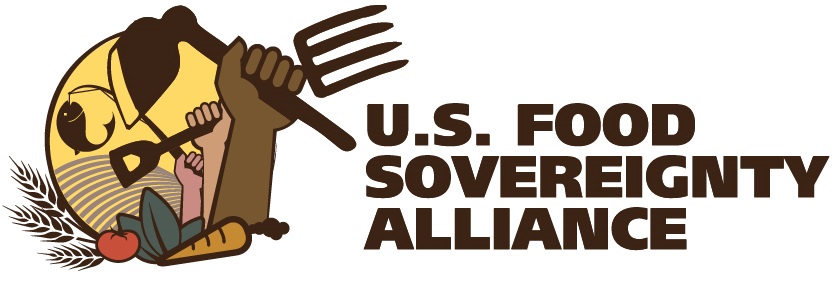The five collectives became integrated into the USFSA’s structure during the IV National Assembly of the Alliance (October 2018). Collectives meet monthly and are open to participation from representatives of member and ally organizations as well as individuals unaffiliated with an organization. Each of the five working groups has representation on the USFSA’s national coordination team.
Youth Process
The Youth Process began in early 2018 prior to the IV National Assembly as an autonomous space for young adults (ages 18 – 35) in the USFSA to build relationships, engage in political education, and explore what a youth articulation of the USFSA could look like, inspired by one member’s experience in youth trainings with other international food movement spaces. After formally being recognized as a collective at the IV Assembly, it has grown and continued to function as a platform for peer-to-peer learning, building leadership and political analysis, and for strengthening organizing skills such as facilitation, note-taking, and collective decision-making. Throughout the Youth Process’s existence, guest speakers from other youth formations have been invited to build relationship and dialogue with members about the role of youth in our movements. The Youth Process has determined its structure, values and principles with a vision to bring important intersectional issues into the USFSA, especially those voiced by young leaders in this political moment, including climate justice, queer ecology, decolonization, dismantling white supremacy, racial justice, and creative, liberatory imagination.
- Listserv email address: usfsayouth@googlegroups.com
- Convener and Listserv Owner/Manager:
- Betty Fermin, WhyHunger, Northeast region, betty@whyhunger.org
Narrative Strategy
The narrative strategy collective coordinates the production and distribution of content through the Alliance’s website and social media platforms. Participants mostly write blogs, create videos, and manage the website. Regular meetings allow for defining the Alliance’s strategic goals and tactics with regard to contesting the hegemony of industrial agribusiness by uplifting the visionary narratives and oppositional actions of grassroots member organizations in particular.
- Listserv email address: usfsanarrative@googlegroups.com
- Convener and Listserv Owners/Manager:
- Andrew Kang Bartlett (interim), Food in Neighborhoods Community Coalition, Midwest region, realakb@gmail.com
Political Education
The political education collective focuses on infusing popular pedagogy and critical perspectives across the Alliance. Participants work on the creation of educational materials pertaining to food sovereignty and agroecology, in addition to hosting webinars and planning a national course for enhancing the capacity of grassroots leaders and grassroots-support networks to advance strategies for consciousness-raising and base-building in the food sovereignty movement. The collective aims to collaborate closely with the narrative strategy and agroecology collectives, specifically in terms of amplifying the role of political education in internal and external communications and agroecology encounters held in the four regions of the USFSA.
- Listserv email address: usfsa-political-education-collective@googlegroups.com
- Conveners and Listserv Owners/Managers:
- Antonio Tovar, National Family Farm Coalition, Northeast region antonio@nffc.net
- Jesus Vasquez, Org. Boricuá de Agricultura Ecológica de PR, jj.vazk@gmail.com
Agroecology, Land, and Water
The agroecology, land, and water collective has identified encuentros (encounters) as a top priority, along with the sharing of knowledge and skills concerning socially-just, ecologically-sound farming and fishing practices. Participants emphasize that agroecology is not only a science but also a political movement of smallholder producers committed to transformative social, economic, and environmental change. To that end, the agroecology collective seeks to create a land trust in accordance with the principles of food sovereignty, and this long-term project merges with USFSA member organization’s broader work of upholding the rights of workers, demanding justice and legal protection for immigrant families, and standing in solidarity with indigenous communities who continue to resist centuries of violence imposed by settler colonialism and capitalism.
- Listserv email address: usfsaagroecology@googlegroups.com
- Conveners and Listserv Owners/Managers:
- Antonio Roman-Alcala, CAFA, Western region, antidogmatist@gmail.com
- Jennifer Taylor, Lola’s Organic Farm, Southern region, everygeneration@gmail.com
International Relations
The international relations collective prepares USFSA members to represent the Alliance abroad in meetings, trainings, delegations, learning exchanges, and policy processes. The working group intends to establish a well-informed cadre of participants who can speak on behalf of the USFSA and report back to the national coordination team following involvement in such international spaces. In addition to bilateral relationships with rural movements such as the MST in Brazil and the ATC in Nicaragua, the international relations cohort aims to strengthen the USFSA’s participation in multilateral spaces, such as the International Planning Committee for Food Sovereignty and the Civil Society Mechanism through the North American region.
- Listserv email address:usfsaintlrelationships@googlegroups.com
- Conveners and Listserv Owners/Managers
- Erika Takeo, Friends of the ATC, Western region, atc@gmail.com
- Saulo Araujo, Friends of the ATC, Northeast region, saulo.m.araujo@gmail.com



